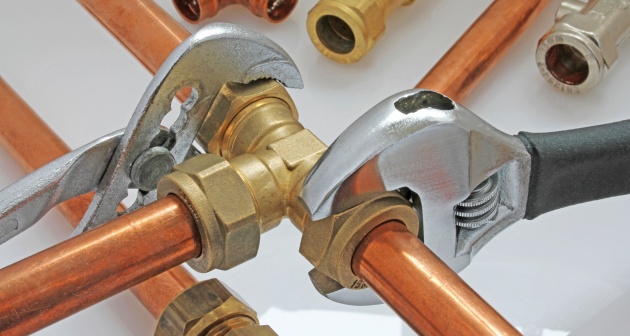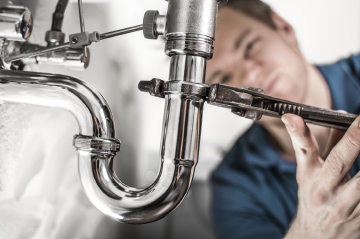Regardless if you are a homeowner or a business owner, be it by yourself or with a small group of people, it’s very important to have a functional plumbing system. The plumbing inside a building is one of the most used assets when compared to other systems, and because of this regular use, it is also one of the systems that will have issues from time to time.
Systemic cleaning regiments and regular maintenance should be incorporated into your regular sprucing-up efforts in your home or office, as this can have a dramatic effect on the different parts of the plumbing system.
Yet even with regular cleaning and maintenance, there is still a chance that a person or company may be subjected to experience issues from time to time, usually with the toilet, septic system, or sewage lines of a building.
Naturally, most machines will wear down and break after many years of use, and plumbing appliances and systems are no different. If you are experiencing problems with your plumbing, or if it is not working correctly anymore, the best course of action for someone to take is to get into contact with a professional plumber.
Nearly everyone understands what a plumber does and why they are important, but not everyone has had to deal with one before. This is often the case with young adults who are living on their own for the first time.
Because of this, some people are not exactly aware of what they should do once they get the contact information for a plumber.
In this article, we will be going over some of the process and steps that homeowners or business owners should consider doing if they are facing a serious plumbing issue and need the assistance of a trusted and credible plumbing professional to assess the situation and correct the plumbing issues. 
Actions Taken Before Calling a Professional Plumber
Assess the Problem: Before reaching out to a plumber, it’s essential to have a clear understanding of the plumbing issue you’re facing, or a general idea of where the issue could be lying in the plumbing system.
This will help you communicate the problem effectively when you contact a plumber. Some common plumbing problems include leaks, clogged drains, running toilets, low water pressure, and water heater malfunctions.
Ask for Recommendations: Personal recommendations from people you trust can be invaluable when searching for a reliable plumber. These recommendations often come with insights into the plumber’s punctuality, work quality, and pricing.
Online Search: Use online resources to find plumbers in your area. Search engines like Google can help you discover local plumbing companies and independent plumbers, but some will be more popular than others, and usually for a good reason. Be sure to include your location in the search terms to find plumbers near you.
Read Reviews: Online reviews and ratings can provide a glimpse into the experiences of past customers. Pay attention to both positive and negative reviews to get a balanced perspective on a plumber’s performance. Keep in mind that not all reviews are truthful. Someone may be inflating their good reviews to make themselves look more apparent than they are, while others companies may use multiple negative reviews of their competitors to make it look as though they are not the right professional for the job.
What to do When Setting Up a Time for A Plumber to Come to Your Residence
Check Credentials: Verify that the plumber you’re considering is licensed and insured. Licensing requirements vary by location, so check with your local regulatory authority or plumbing board to confirm the plumber’s credentials.
Keep in mind that not all professionals that would be assisting you with a plumbing issue are to be licensed. These individuals must be working under a supervisor who has the necessary credentials, but plumbing apprentices may be the actual person that fixes a specific issue that you have.
Contact Multiple Plumbers: Don’t limit your options. Reach out to several plumbers to compare their services, availability, and pricing. This allows you to make an informed decision based on your specific needs and budget. Depending on the specific issue, money may not be the only thing to consider when getting into contact with a professional plumber. It is important to understand that availability is a huge factor, and some plumbers may not be able to see you as soon as you have hoped for.
Request Quotes: When contacting plumbers, describe your plumbing issue as accurately as possible. Request written estimates that detail the cost of labor and materials. Be sure to inquire about any potential additional charges, especially for emergency services.
Verify Availability: Ensure that the plumber is available when you need them. If it’s an urgent issue, inquire about their availability for emergency services, especially if it’s outside of regular business hours.
Ask Questions: Engage in a conversation with potential plumbers to gauge their expertise and professionalism. Some questions you might ask include:
- How long have you been in business?
- Have you handled similar plumbing issues before?
- Do you offer any warranties or guarantees on your work?
- What is your approach to problem-solving?
- Can you provide references from past clients?
Check for permits if Necessary: For larger plumbing projects, such as bathroom renovations or water heater installations, confirm that the plumber obtains the necessary permits from your local building department. This ensures compliance with local building codes.
Agree on a Schedule: Once you’ve selected a plumber, agree on a convenient schedule for the service or repair. Clearly communicate your expectations regarding timing and completion to avoid misunderstandings.
Keep in mind that a person may not always need to be home for specific issues that a plumber may be doing for a client of theirs. Most people are uncomfortable having one or more strangers in their home with them not present, but some individuals may find it necessary to not be home while work is being done due to life circumstances.
How Individuals Should Plan for Plumbing Professionals In Their Residence
Prepare for the Visit: Before the plumber arrives, make sure to clear the area around the plumbing problem. Remove any obstacles or items that might hinder their work. This will help the plumber work efficiently and effectively.
This includes keeping small children and animals away from professionals and the areas that they will be working in. This helps protect the plumbing professionals, as well as protecting the children and animals that means the most to homeowners.
Payment Terms: Discuss payment terms and methods with the plumber upfront. Some plumbers may require a deposit before starting work, while others may bill you after the job is completed. Be sure to clarify payment expectations to avoid surprises.
Always remember to never pay for a task in full before it is actually completed. Individuals or companies with lower integrity may take it upon themselves to never finish a job that has already been fully paid for.
Get the Work in Writing: To protect both parties, it’s crucial to have a written contract or agreement that outlines the scope of work, costs, payment schedules, and any warranties or guarantees. This document should be signed by both you and the plumber. This step may not always be applicable, as many different cities, counties, and states have different laws and protocols for this type of procedure.
Follow Up: After the plumber completes the job, take the time to inspect the work to ensure it meets your expectations. If you notice any issues or have concerns, communicate them promptly to the plumber for resolution. A reputable plumber will stand by their work and address any issues promptly.
Maintain Contact Information: It may be a good idea to keep the plumber’s contact information for future reference or in case of plumbing emergencies. Having a trusted plumber’s contact info on hand can save you time and stress when unexpected plumbing problems arise.
This is just a brief overview of a standardized process of how a homeowner may want to go about getting into contact with a plumbing professional that can fix their specific needs.
By following these steps and considering these factors, you’ll be better equipped to find a qualified and reliable plumber to address your plumbing needs effectively. A well-informed choice will help you maintain a well-functioning plumbing system in your home or business.
